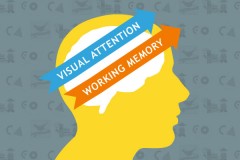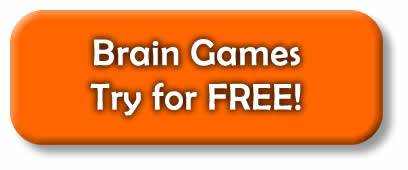Study: Brain Games Give Cognitive Boost

For years, we’ve heard first that we should keep sharp by doing crossword puzzles or similar brain-challenging activities, only to find later that research has been unable to prove their effectiveness in stemming cognitive decline, much less boosting performance.
Usually, studies show improvements only in the same activity: do Sudoku puzzles, and you get better at Sudoku puzzles… but no benefits transfer to other performance domains. Now, a new study published in the Mensa Research Journal shows that subjects who used an online cognitive exercise program from Lumosity improved their visual attention and working memory significantly more than a control group.
Why This Is Important
This study appears to be the first peer-reviewed publication of work that shows that web-based training can actually produce improvements in general measures of cognitive performance. If other research supports these findings, I’d anticipate a boom in the use of this type of training – who wouldn’t add a few brain games to their daily regimen if the exercises actually improved cognitive function?
Twenty Minutes, Five Weeks
The experiment compared a control group with a group of subjects who used did the training exercises for twenty minutes a day for five weeks. The control group showed no cognitive improvement, while the training group showed a 20% improvement in visual attention and a 10% improvement in working memory.
One Caution. The only thing that gives me pause about this work is that most of the study authors are employed by Lumos Labs, the firm whose software was used for the test. Two have affiliations with Stanford University and San Francisco State University, though, and the Mensa Research Journal, though likely not as selective as Neuron, is peer-reviewed. Still, I’d prefer the work to have been independently funded and conducted by unaffiliated researchers.
The Good News. If there’s a benefit to the rather commercial flavor of the research, it’s that the product tested is readily available. Often, research findings need to be translated into a commercial product which may or may not closely duplicate what was tested in the lab setting. Here, the researchers evaluated the commercial product, so nothing should be lost in translation.
Decide for Yourself: Free Trial
Want to decide for yourself if the web training works? Neuromarketing readers can try the Lumosity brain game training program for FREE by clicking this link:
I’d be very interested in any feedback from Neuromarketing readers on the Lumosity product. Feel free to post a comment below.
Disclosure: While the links are affiliate links, I have no relationship with or financial interest in Lumosity.


Hi Roger,
How do these exercises compare to n-back training? The potential benefits seem similar.
Thanks!
Matt
I’m not sure how the two compare, Matt… maybe someone here has tried both!
Roger
I’ve used Lumosity off and on for about three years, and found the exercises do help focus my attention and improve my memory. The program also challenges your problem-solving skills, and the speed and flexibility of your thinking.
First though, Lumosity is fun. The games are engaging and the company regularly publishes new games while retaining old ones.
They have developed several training programs, both general and specific to certain areas of cognition, that keep players moving forward. You can also play whatever games you like at any time.
Your stats show how well you’re doing compared to your own record, as well as the combined stats of other Lumosity users (who also tend to value mental exercise).
When I play consistently, the trajectory of improvement is rapid and clear. Also clear is the rather steep drop in my scores, or what Lumosity calls your “Brain Performance Index”, when I stopped playing for about a year. Overall though, my BPI remains higher than when I started.
Specifically, during the first six months of play my BPI jumped more than 20%. When I didn’t play at all during the following 12 months, I lost most of that gain (about 80%). Over the next 18 months my scores surpassed the original gain, for an overall improvement of about 30%.
I haven’t played in about three months but coincidentally played a few games on my iPhone last night. My BPI did not drop in that time, so I believe there is a net benefit to playing brain games that doesn’t disappear when you don’t play.
That’s an interesting observation, Terre. It would be good to think that gains persist, at least for a while.
As a copywriter, I’ve found Luminosity’s free Word Bubbles game helpful. In fact, I’ve recommended it to my copywriter coworkers for the simple fact that it helps blow the dust off of often overlooked words in our vocabularies.
Any feedback on Posit Science? Anyone used their stuff? They promote their wares pretty widely and claim better results, with better data than Lumosity.
http://www.positscience.com/
Posit counts Dr. Michael Merzenich, a key figure in demonstrating neuroplasticity, as a founder. I would think their stuff is reasonably good and science-based. More info:
Brain Fitness Software Featured on PBS Now 10% off. Use Coupon Code PSCCJ1009
I’m a big fan of Lumosity. Can definitely see improvement in my metrics over time and just feel better overall (placebo possibly?). Basically echo everything Terre had to say.
Thank you Roger,
I love the way you write – with your audience always in mind.
I thought I would give the FREE TRIAL a go; below is where my ‘ability to filter out distraction’ ‘gave me PAUSE’ about this free trial:
? ‘START YOUR FREE TRIAL’ it says. How? ‘CHOOSE A MEMBERSHIP PLAN’ seems the way to go…
? Three options: from $4.99 to $14.95/month – PAUSE – it didn’t look like I could get away without picking one.
Note: two of the options are ‘*billed as one payment’ – PAUSE – keep in mind that even @ $4.99/month, you will be charged $119.76 on the 15th day whether you’re play brain games or not.
? ‘YOUR CREDIT CARD WILL NOT BE CHARGED NOW’ (in bold) – PAUSE – TRANSPARENCY or DISTRACTION?; further down, same paragraph:
‘IF YOU DON’T WANT TO CONTINUE USING LUMOSITY, JUST CANCEL ANYTIME IN THE NEXT 14 DAYS AND YOU WON’T BE CHARGED. OTHERWISE, YOU’LL PAY JUST $79.95 FOR THE SERVICE.’ – PAUSE – PAY JUST…?
Where did the FREE TRIAL go???…
Cooling-off periods have proved to be effective for organisations wanting to cover their costs as cancelling a deal require more than just a click of the mousse and can be quite tricky.
The feedback in the previous posts is quite positive thus good value for money, it seems, which makes me wonder what the marketing department was thinking when setting up this “FREE TRIAL”. Why a catch?
Improving an unhappy customer’s memory, I would not recommend; it could cost in a long run…
It is a beautiful Sunday morning in Geelong (Australia) and a day for self-reflection and ‘Thinking outside the box’.
Kind regards,
Danièle
Danièle, I looked at the signup process and I’d say they are exploiting the concept that many people, through inertia or forgetfulness, won’t opt out after signing up. This is very common in all kinds of marketing, notably the “free issue” offers from magazines that enroll you in a year’s subscription if you don’t cancel.
The downside to this approach, in my opinion, is that many fewer will sign up in the first place because of the need to provide a credit card and full contact info. If I were designing the offer, I’d want to make the signup process simple and start delivering some useful content right away. I’d then have a process to encourage becoming a paid member.
What if, for example, you used one game for free (no CC needed) for a week and were told (truthfully) that your working memory improved by __% and to keep progressing you needed to become a paid member. I think the conversion rate for this process would be far higher. Far more people would try the product, and even with the inevitable attrition I’d expect more paid signups.
Roger
Give and take vs Take and give.
Thank you for a very nice reply.
Danièle
Actually, Danièle, there’s research showing that “give and take” converts better, at least in some cases. As I described in Collecting Visitor Info: Reward vs. Reciprocity, a test showed that giving a web visitor access to free content BEFORE getting his email worked better than what 99% of all websites do: force the user to sign up in order to access the content.
What is your knowledge of brain training centers such as LearningRX or Brain Balance? I know there’s a significant investment and Brain Balance only works with school age children/young adults.
No idea, Randy, but with any program I’d ask to see the research that shows its effectiveness. Ideally, any such studies would be robust and peer-reviewed, but what level of proof you’ll accept is a judgment call. I’d ignore all testimonials and anecdotal data, as they don’t really prove anything – that’s particularly true for an area like cognitive abilities that are difficult to measure.
Roger
I Have been promoting lumosity for a while now on my site, good to see it’s getting recognized by others as well!
I love Brain Games and pages like Lumosity! These people get quite some users
One that I couldn’t understand – is their positive results confirmed by other research?
Ven, I’m not aware of additional confirming studies. However, with the funding that Lumos is getting and the growth in this category, I’m sure we’ll find independent research coming along soon. Probably more from the companies themselves, too, though I’d prefer totally independent studies.
Roger
I believe that what happened to Terre is that by playing Luminosity he triggered his brain to think in a certain way. I think that his ability doesn’t slow down because his brain continues to act in a certain manner without him realizing it.
Great thing!
Lumosity really works well. It helps to increase visual attention, at least to me. Going to give it a further try. Thanks for sharing.